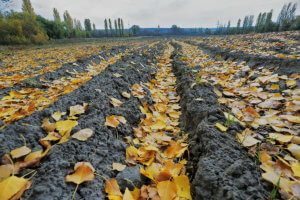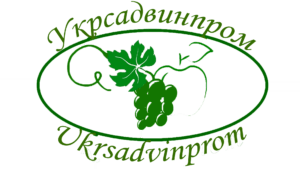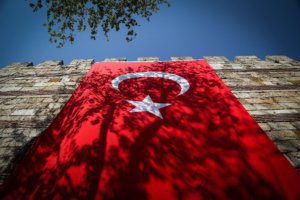
A group of people’s deputies on the initiative of the Ukrainian Agrarian Council on December 4 registered in the Verkhovna Rada of Ukraine bill No. 9355-5 extending the land moratorium until January 1, 2020, the association said. “Despite the fact that Ukraine is constantly debating on the possible introduction of the land market, we have not yet been submitted a draft law on farmland turnover. This issue is extremely worrying for domestic farmers and raises many questions. Under such circumstances, it’s too early to talk about lifting the moratorium,” deputy chairman of the Ukrainian Agrarian Council Denys Marchuk said.
The authors of the draft law on amendments to the Transitional Provisions section of the Land Code of Ukraine regarding the extension of the ban on alienation of agricultural land were Oleksandr Bakumenko, Petro Yurchyshyn, Mykola Kucher, Valeriy Davydenko, Leonid Kozachenko, Andriy Kot, Mykola Liushniak, Serhiy Labaziuk, Valentyn Didych, Ivan Kyrylenko, Anatoliy Kuzmenko, Oleh Kulinich, and Vadym Ivchenko.
The association noted, with reference to the explanatory note to draft law No. 9355-5, that political speculation that the land market will be introduced from January 1, 2019 creates tension in the society and does not contribute to citizens’ confidence in the reforms that are implemented in the state.

Ukraine’s Verkhovna Rada has passed an amendment to the Tax Code, according to which the excise duty on fruit and berry wines is reduced to UAH 0.01 per liter, Head of the Ukrsadvynprom association Volodymyr Pechko has said. “The Verkhovna Rada reduced the excise duty on fruit and berry wines and equated it to the excise duty on grape wines. Previously, it was equated with liquor and vodka products. This industry was dilapidated when there was ‘draconian’ legislation. And now the conditions are optimal to resume production of fruit and berry wines,” he told Interfax-Ukraine. According to a comparative table, the tax rate on non-sparkling wines with 1.2-15% ABV will be UAH 0.01 per liter.
According to the head of Ukrsadvynprom, the parliament also agreed on changes, according to which, new producers of wine products will be considered the fourth group of taxpayers using the simplified taxation system.
As reported, the Cabinet of Ministers has increased government support for hop growing, laying of young gardens, vineyards and berries, from UAH 300 million in 2018 to UAH 400 million in 2019.
According to Pechko, this increase in state support is advisable, since in 2018 the industry will use all the allocated funds. “At the summer meeting the budget allocation committee of the Ministry of Agrarian Policy and Food allocated compensation only for planting material, and at a meeting in autumn refrigerators, shock freezing and sorting lines (except seedlings) will also be reimbursed for. Virtually all funds for gardening will be used,” he explained.
At the same time, the head of Ukrsadvynprom noted that to develop the industry, it is necessary to spend more funds on product processing. “We need to finance not only planting, but also processing, sorting and storing fruits and berries. In particular, funds should be allocated for processing – refrigerators, blast chilling chambers for berries, processing into new products – apple chips, dried goods, grape and fruit wine,” Pechko said.
He added that an increase in processing volumes in future will help fruit and berry producers in the years with large harvests. “This year the price of products of further processing – raspberries, currants, apples – has fallen. Purchase prices for apples, for example, at the plants were UAH 0.52/kg, raspberries some UAH 10-12/kg. This is a very low price, considering harvesting costs. The reduction in excise tax on fruit and berry wine will enable enterprises to process their products themselves,” the expert said.
As reported, the Verkhovna Rada redirected UAH 1 billion from the programs of state support for the agro-industrial complex to the Regional Development Fund. The total amount of state support for agriculture will be about UAH 6 billion. According to information on the website of the Ministry of Agrarian Policy and Food, as of November 16 some 35.8% of state support for the agro-industrial complex had been used. Out of UAH 300 million provided for hop growing and gardening, some UAH 101 million has been used.

Ukraine’s Verkhovna Rada has passed an amendment to the Tax Code, according to which the excise duty on fruit and berry wines is reduced to UAH 0.01 per liter, Head of the Ukrsadvynprom association Volodymyr Pechko has said. “The Verkhovna Rada reduced the excise duty on fruit and berry wines and equated it to the excise duty on grape wines. Previously, it was equated with liquor and vodka products. This industry was dilapidated when there was ‘draconian’ legislation. And now the conditions are optimal to resume production of fruit and berry wines,” he told Interfax-Ukraine.
According to a comparative table, the tax rate on non-sparkling wines with 1.2-15% ABV will be UAH 0.01 per liter.
According to the head of Ukrsadvynprom, the parliament also agreed on changes, according to which, new producers of wine products will be considered the fourth group of taxpayers using the simplified taxation system.
As reported, the Cabinet of Ministers has increased government support for hop growing, laying of young gardens, vineyards and berries, from UAH 300 million in 2018 to UAH 400 million in 2019.

Ukraine’s Verkhovna Rada has approved a resolution on the conclusions and proposals to a bill on the national budget for 2019 drawn up by the parliamentary budget committee, which means the adoption of the draft national budget at first reading. An Interfax-Ukraine correspondent has reported that a total of 240 MPs backed the budget conclusions of the Verkhovna Rada. In addition, MPs on Thursday approved at first reading bill No. 9084 from the so-called budget package. The bill amends the Budget Code.
According to the Budget Code and the regulations of the Verkhovna Rada, the draft national budget for the next year should be adopted at first reading before October 20, although last year it happened only on November 14. After that, the Cabinet of Ministers, with the participation of the parliamentary budget committee, should, within 14 days, but no later than November 3, submit an updated draft to the Rada, taking into account its budget conclusions with a comparative table and explanations of the reasons for refusing individual proposals of the parliament.
Consideration of the draft national budget for 2019 at second reading should be completed before November 20, and at third reading with final approval – before December 1.

Ukrainian Prime Minister Volodymyr Groysman has said he expects the Verkhovna Rada to adopt the country’s draft state budget for 2019 at first reading during the current plenary week from October 16 to 19. “This week we are expecting budget conclusions and the first reading of the draft state budget for 2019. People’s deputies have already submitted more than 2,000 proposals,” Groysman wrote on his Facebook page.
BUDGET, DRAFT, PARLIAMENT, PM

The Verkhovna Rada has ratified the agreement between the governments of Ukraine and the Republic of Turkey on mutual assistance and investment protection, which provides Ukrainian and Turkish investors with assistance in use of investments, as well as secures guarantees against illegal expropriation and nationalization. Some 244 people’s deputies supported the corresponding bill with the quorum being 226 votes.
According to the website of the Ministry of Economic Development and Trade, the agreement also provides for the free transfer of payments and the application of internationally recognized dispute settlement procedures.
In addition, the parliament ratified the trade agreement between Ukraine and the Kingdom of Thailand.
The corresponding bill, providing for the creation of a special intergovernmental commission on trade, was supported by 241 people’s deputies.